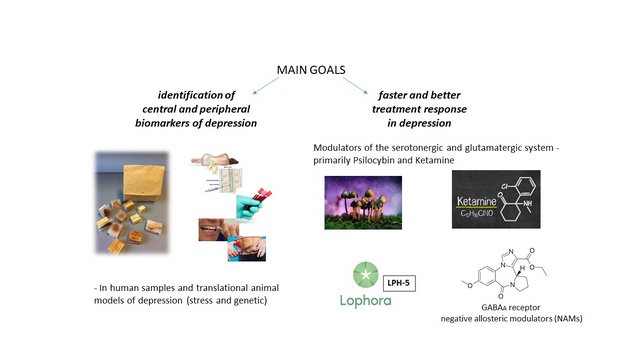Betina Elfving – Experimental and Molecular Psychiatry
Our research is focused on psychiatric disorders in particularly depression. Our studies are translational including animal models and human samples (brain, blood, saliva etc), integrating behavioural, molecular, biochemical, and pharmacological approaches.
Research focus
Depression is a complex disorder with many subtypes and probably more than one etiopathophysiological mechanism.
Our research in depression focuses on
• neuroplasticity, i.e. changes in growth factors/neurotrophic factors, spine density markers and synaptic vesicle proteins
• inflammation, the involvement of cytokines and the kynurenic pathway
• the hypothalamic-pituitary-adrenal (HPA) axis
• the crosstalk between the glutamatergic and serotonergic transmitter system
• disturbances in central and peripheral clock genes
• the regulation of microRNAs (miRNAs)/mRNAs in rodent models of depression as well as human brain and blood.
Besides exploring the fundamental basics of depression at the miRNA, mRNA and protein levels, new treatment strategies are also key components in our research. The treatment portfolio includes traditional pharmacological treatment, rapid-acting antidepressants, electroconvulsive seizures, exercise, and probiotics.
Our goal is to identify new unexplored mechanisms, leading to identification of molecular biomarkers and new avenues for development of novel stratified strategies for prevention and treatment of depression.
Aim
The overall aims are to unveil fundamental central and peripheral biological mechanisms of depression and to identify biomarkers – central and peripheral.
Main research methods
The fundamental basics of our research are animal models of stress and depression and human blood, saliva, and tissue.
Our main research methods are:
- Real-time qPCR (MX3005P or Fluidigm) with
- mRNA and miRNA extracted from brain, blood, liver, adrenal glands, heart, muscles, skin etc (rodents and human).
- miRNA extracted from FFPE blocks from the Brain Collection
- Extraction of RNA and protein from the same piece of tissue with PARIS kit
- ELISA
- Luminex, multiplexing up to 100 analytes in one sample. Studies have been conducted with rat and human brain, cerebrospinal fluid, blood, muscles, liver, and adrenal glands.
- Homogenate studies with tissue (binding/uptake)
- Cell studies (binding/uptake)
- Subcellular fractionation by Percoll (glia cells, synaptosomes)
Available projects
The Elfving group currently has projects available for Research Year, Bachelor, Master, and PhD students from relevant disciplines such as medicine, molecular medicine, molecular biology, or pharmacology.
Please contact Principal Investigator Betina Elfving directly, if interested
(betina.elfving@clin.au.dk or phone 28966726).

